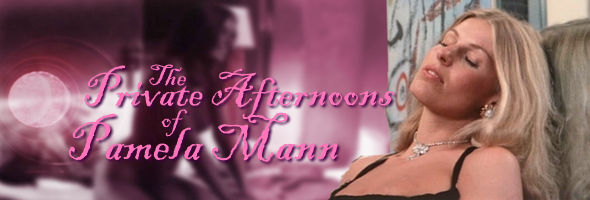
Color, 1974, 83/72m.
Directed by Henry Paris (Radley Metzger)
Starring Barbara Bourbon, Eric Edwards, Georgina Spelvin, Alan Marlow, Levi Richards, Sonny Landham, Marc Stevens, Darby Lloyd Rains, Jamie Gillis
Distribpix (DVD) (US R0 NTSC) / WS (1.85:1) (16:9), Alpha France (France R2 PAL) / WS (1.85:1), VCA (US R0 NTSC)
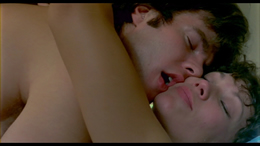
A wealthy Manhattan exec (Marlow, with a weird orange bronzer) hires a shifty, camera-toting private eye (Edwards) to follow and film his wife, Pamela (Bourbon), who spends her free afternoons engaging in a series of random sexual encounters. Of course, the act of voyeurism brings out the scoundrel in Edwards, who finds himself drawing closer and closer to his target. Meanwhile other characters become involved in this posh game of sexual tag including Pamela's maid (Rains, later the star of Metzger's Naked Came the Stranger), a politician (future mainstream Predator actor Sonny Landham), and her best friend (Devil in Miss Jones' Spelvin) who happens to be a hooker, before the big twist ending calls everything we’ve seen into question.
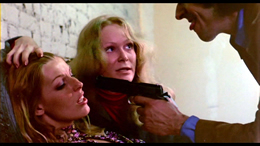 Though director Radley Metzger tap danced around the issue of actual sex in such films as Score and The Image, he didn't make the full transition to hardcore until 1974's The Private Afternoons of Pamela Mann. Shot cheaply in 16mm, the film nevertheless exhibits the visual polish and skillful eye of its director throughout as it imaginatively uses New York locales as a sort of giant board game upon which the characters act out some of their wildest fantasies. Loaded with witty one liners and some nice movie in-jokes, Pamela Mann (which shares its heroine’s name with a real-life grindhouse figure) speeds by quickly during its brief running time. A knowledge of porn's social history will probably help, particularly concerning a running gag with a great punchline in which a female hippie repeatedly approaches Pamela and polls her on current news issues. As with most '70s classics, the acting and storyline are comparable to many mainstream titles being produced at the time; in fact, with a few alterations this script could make a very bubbly romantic comedy. However, Pamela will be of most interest to viewers familiar with Metzger, for whom this marks an interesting mid-career transition from the languid, European gloss of his earlier films to a snappier, more audacious editing style which directly engages the viewer in the unspooling of its plot. This direction really began with The Lickerish Quartet, which turns the film vs. reality approach into a beguiling series of Chinese boxes, but here he addresses the physical act of filming, with its shutterbug private eyes producing the interlocking series of visuals we witness throughout the film until the deliberately stagy, elegant final shot. Though not as intricate and continental as The Opening of Misty Beethoven or as literate as Naked Came the Stranger, this first outing from Metzger's "Henry Paris" period remains one of his strongest efforts overall and serves its purpose as both a steamy adult film and an accomplished work of cinematic art.
Though director Radley Metzger tap danced around the issue of actual sex in such films as Score and The Image, he didn't make the full transition to hardcore until 1974's The Private Afternoons of Pamela Mann. Shot cheaply in 16mm, the film nevertheless exhibits the visual polish and skillful eye of its director throughout as it imaginatively uses New York locales as a sort of giant board game upon which the characters act out some of their wildest fantasies. Loaded with witty one liners and some nice movie in-jokes, Pamela Mann (which shares its heroine’s name with a real-life grindhouse figure) speeds by quickly during its brief running time. A knowledge of porn's social history will probably help, particularly concerning a running gag with a great punchline in which a female hippie repeatedly approaches Pamela and polls her on current news issues. As with most '70s classics, the acting and storyline are comparable to many mainstream titles being produced at the time; in fact, with a few alterations this script could make a very bubbly romantic comedy. However, Pamela will be of most interest to viewers familiar with Metzger, for whom this marks an interesting mid-career transition from the languid, European gloss of his earlier films to a snappier, more audacious editing style which directly engages the viewer in the unspooling of its plot. This direction really began with The Lickerish Quartet, which turns the film vs. reality approach into a beguiling series of Chinese boxes, but here he addresses the physical act of filming, with its shutterbug private eyes producing the interlocking series of visuals we witness throughout the film until the deliberately stagy, elegant final shot. Though not as intricate and continental as The Opening of Misty Beethoven or as literate as Naked Came the Stranger, this first outing from Metzger's "Henry Paris" period remains one of his strongest efforts overall and serves its purpose as both a steamy adult film and an accomplished work of cinematic art.
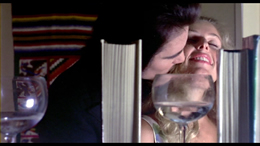 Released during the heyday of porno chic, Pamela Mann was released in both hard and softcore versions. The former remains the most frequently seen and was released on VHS and DVD first by VCA, though all of their versions lost a significant, eight minute sequence in which Pamela acts out a kidnap/rape fantasy in a garage with Rains and her chauffeur, Jamie Gillis, with the latter holding her down at gunpoint. Though really consensual, this scene was apparently too much in the wake of NOW porn demonstrations and still carries a definite charge. Fragments of the sequence still turned up again during the long montage at the end of the film in the cut version, rendered the finale completely senseless. As with its other Henry Paris titles, VCA recycled its one-inch video master for their DVD, taken from a battered print with a dated, lackluster appearance with numerous flaws and inconsistencies in the appearance of what was meant to be a smooth, glittery film with lush colors. The strange white borders at the top and bottom periphery which plague all VCA transfers of Misty Beethoven are also present here, too, depending on your TV's overscan setting. As usual VCA listed plenty of extra goodies on the back, though only a few pertain to the film itself. Best of the bunch is a feature length commentary with Edwards and the very active Veronica Hart. They make for lively company, though Edwards frequently mentions his lagging memory and insists over and over that he's retired from the business. Nevertheless they do get in a few fun facts, such as a casual mention that Spelvin recently worked as Hart's babysitter! Other bonuses include reproductions of the original B&W pressbook ad slicks, the VCA tape box art (which is nearly identical), and a gallery of stills (not frame grabs, thankfully), as well as a three minute video appraisal by Jim Holliday. The other extras are more extraneous, such as a "production stills" gallery from some other unnamed project and promos for other VCA titles. Oddly, the full garage scene was included in full (albeit looking very rough) in the compilation documentary The World of Henry Paris, which was briefly available on VHS and appeared occasionally on adult cable channels.
Released during the heyday of porno chic, Pamela Mann was released in both hard and softcore versions. The former remains the most frequently seen and was released on VHS and DVD first by VCA, though all of their versions lost a significant, eight minute sequence in which Pamela acts out a kidnap/rape fantasy in a garage with Rains and her chauffeur, Jamie Gillis, with the latter holding her down at gunpoint. Though really consensual, this scene was apparently too much in the wake of NOW porn demonstrations and still carries a definite charge. Fragments of the sequence still turned up again during the long montage at the end of the film in the cut version, rendered the finale completely senseless. As with its other Henry Paris titles, VCA recycled its one-inch video master for their DVD, taken from a battered print with a dated, lackluster appearance with numerous flaws and inconsistencies in the appearance of what was meant to be a smooth, glittery film with lush colors. The strange white borders at the top and bottom periphery which plague all VCA transfers of Misty Beethoven are also present here, too, depending on your TV's overscan setting. As usual VCA listed plenty of extra goodies on the back, though only a few pertain to the film itself. Best of the bunch is a feature length commentary with Edwards and the very active Veronica Hart. They make for lively company, though Edwards frequently mentions his lagging memory and insists over and over that he's retired from the business. Nevertheless they do get in a few fun facts, such as a casual mention that Spelvin recently worked as Hart's babysitter! Other bonuses include reproductions of the original B&W pressbook ad slicks, the VCA tape box art (which is nearly identical), and a gallery of stills (not frame grabs, thankfully), as well as a three minute video appraisal by Jim Holliday. The other extras are more extraneous, such as a "production stills" gallery from some other unnamed project and promos for other VCA titles. Oddly, the full garage scene was included in full (albeit looking very rough) in the compilation documentary The World of Henry Paris, which was briefly available on VHS and appeared occasionally on adult cable channels.
A better-looking flat letterboxed version appeared much later on DVD in Europe from Alpha France (under the odd title of Furie Porno), paired up with a gorgeous transfer of Richard Robinson’s Marriage and Other Four Letter Words. Both are in French only, however, and while this Pamela Mann contains the garage assault in full, it omits huge chunks of comedic dialogue that presumably wouldn’t carry over for a French audience; thus, it’s still highly incomplete, just in a different way.
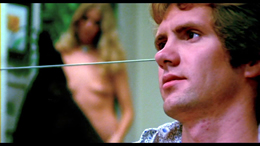 Fortunately the Henry Paris library eventually fell into the more capable hands at Distribpix, who resuscitated this film with a new hi-def transfer of both the explicit and soft versions. Image quality is drastically improved across the board; the framing is now correct (no more ugly white flaring around the borders), colors are back to their original intensity and values, and detail is much more heightened and impressive. (And unlike their release of Maraschino Cherry, there’s thankfully no logo watermarking anywhere.) The sound quality also kills the VCA version, which was tinny and muffled in comparison. Best of all, this marks the first time the film has been available completely uncut on DVD anywhere in the world, with the garage scene and all of the dialogue completely intact. This alone would be enough to justify the release, but the two-disc set contains a staggering amount of well-researched extras that raise the bar miles higher for ‘70s adult classics.
Fortunately the Henry Paris library eventually fell into the more capable hands at Distribpix, who resuscitated this film with a new hi-def transfer of both the explicit and soft versions. Image quality is drastically improved across the board; the framing is now correct (no more ugly white flaring around the borders), colors are back to their original intensity and values, and detail is much more heightened and impressive. (And unlike their release of Maraschino Cherry, there’s thankfully no logo watermarking anywhere.) The sound quality also kills the VCA version, which was tinny and muffled in comparison. Best of all, this marks the first time the film has been available completely uncut on DVD anywhere in the world, with the garage scene and all of the dialogue completely intact. This alone would be enough to justify the release, but the two-disc set contains a staggering amount of well-researched extras that raise the bar miles higher for ‘70s adult classics.
Metzger’s recent relaxation about doing audio commentaries on releases like Camille 2000 and Score carries over here with a enjoyable and very thorough chat with adult film historian “Benson Hurst” with topics ranging from the director’s segue into hardcore territory due to commercial demands to his switch to shooting on the streets of Manhattan after jetting around Europe in his previous films. (Appropriately, both methods would collide with delirious results two films later with his masterpiece in the genre and still the best adult film of all time, The Opening of Misty Beethoven.) He also reveals a great deal about almost every actor in the film including how they were hired, their colorful and very different backgrounds, and their easy working methods, which wouldn’t exactly carry over as smoothly to future Paris films. Perhaps even more impressive from a scholarly perspective is an optional music subtitle track, similar to the trivia tracks on Shameless’ horror DVD releases, which dissects the film’s music soundtrack in staggering detail. Metzger had used library music (also referred to as stock or royalty-free music) in Score and The Image as well, and his use of preexisting music in all of his Henry Paris titles is exceptional. Using yellow subtitles, this track discusses each selection of music in the film (with only one still unidentified, that sweeping piece used during the final scene) and rattles off huge amounts of trivia about each composer, the track’s significance and library album location, and much, much more.
Two extensive video interview are included with both Edwards and Spelvin, with the former getting 40 minutes to cover a lot of the ground from his earlier VCA commentaries along with a few new comments about working with some of the biggest names both in front of and behind the camera during the porno chic heyday. He’s always a fun storyteller, and it’s great to have him back on a DVD again. Spelvin fans will definitely enjoy her new video chat (allocated to the second disc), which begins with her early stage and screen career (including Hello, Dolly!), her first film role doing new scenes for the Metzger-released The Twilight Girls, and a tour of highlights through her adult career and her life afterwards (which is also covered in her excellent autobiography). Disc two also includes the aforementioned HD transfer of the film’s hilarious “soft” version, which opens with Bourbon talking about this special “bicentennial” edition of the film and features her superimposed over the more graphic footage talking at ridiculous length about America’s fondness for the word “big” and the importance of marriage, sometimes while wearing absurd costumes like a football uniform. The whole approach manages to make the film far more avant garde and absurdist than before, with the talking box technique inadvertently coming off like a precursor to Peter Greenaway’s Paintbox experiments years later. Other extras include the original (very long) theatrical trailer, a 2011 reissue video trailer, galleries of promo stills / production shots and promotional material, a seven-minute video featurette about the film’s locations (some of which are still recognizable), a “Metzger’s Manhattan” piece about how locations were chosen and filmed in his Paris titles, and a fascinating “Cutting Floor” piece containing some amusing outtakes from Bourbon and Stevens’ park encounter and lengthy snippets of a deleted sequence with Bourbon role playing as a 42nd Street hooker and getting involved in a hotel room tryst with Leo and Linda Lovemore (who are otherwise only fleetingly visible in the final film). The hefty insert material includes a nice Bourbon postcard, a small flier for the upcoming Music of Henry Paris deluxe CD release (finally!), and extensive liner notes by Benson Hurst, Ian Culmell, and Lawrence Cohen about the production, soundtrack creation, and cinematic significance of the film; each are very informative and make for highly recommended reading. A tantalizing insert also promotes a CD release of music from the five Henry Paris films, which sort of materialized with the soundtrack of Misty.



 Though director Radley Metzger tap danced around the issue of actual sex in such films as Score and The Image, he didn't make the full transition to hardcore until 1974's The Private Afternoons of Pamela Mann. Shot cheaply in 16mm, the film nevertheless exhibits the visual polish and skillful eye of its director throughout as it imaginatively uses New York locales as a sort of giant board game upon which the characters act out some of their wildest fantasies. Loaded with witty one liners and some nice movie in-jokes, Pamela Mann (which shares its heroine’s name with a real-life grindhouse figure) speeds by quickly during its brief running time. A knowledge of porn's social history will probably help, particularly concerning a running gag with a great punchline in which a female hippie repeatedly approaches Pamela and polls her on current news issues. As with most '70s classics, the acting and storyline are comparable to many mainstream titles being produced at the time; in fact, with a few alterations this script could make a very bubbly romantic comedy. However, Pamela will be of most interest to viewers familiar with Metzger, for whom this marks an interesting mid-career transition from the languid, European gloss of his earlier films to a snappier, more audacious editing style which directly engages the viewer in the unspooling of its plot. This direction really began with The Lickerish Quartet, which turns the film vs. reality approach into a beguiling series of Chinese boxes, but here he addresses the physical act of filming, with its shutterbug private eyes producing the interlocking series of visuals we witness throughout the film until the deliberately stagy, elegant final shot. Though not as intricate and continental as The Opening of Misty Beethoven or as literate as Naked Came the Stranger, this first outing from Metzger's "Henry Paris" period remains one of his strongest efforts overall and serves its purpose as both a steamy adult film and an accomplished work of cinematic art.
Though director Radley Metzger tap danced around the issue of actual sex in such films as Score and The Image, he didn't make the full transition to hardcore until 1974's The Private Afternoons of Pamela Mann. Shot cheaply in 16mm, the film nevertheless exhibits the visual polish and skillful eye of its director throughout as it imaginatively uses New York locales as a sort of giant board game upon which the characters act out some of their wildest fantasies. Loaded with witty one liners and some nice movie in-jokes, Pamela Mann (which shares its heroine’s name with a real-life grindhouse figure) speeds by quickly during its brief running time. A knowledge of porn's social history will probably help, particularly concerning a running gag with a great punchline in which a female hippie repeatedly approaches Pamela and polls her on current news issues. As with most '70s classics, the acting and storyline are comparable to many mainstream titles being produced at the time; in fact, with a few alterations this script could make a very bubbly romantic comedy. However, Pamela will be of most interest to viewers familiar with Metzger, for whom this marks an interesting mid-career transition from the languid, European gloss of his earlier films to a snappier, more audacious editing style which directly engages the viewer in the unspooling of its plot. This direction really began with The Lickerish Quartet, which turns the film vs. reality approach into a beguiling series of Chinese boxes, but here he addresses the physical act of filming, with its shutterbug private eyes producing the interlocking series of visuals we witness throughout the film until the deliberately stagy, elegant final shot. Though not as intricate and continental as The Opening of Misty Beethoven or as literate as Naked Came the Stranger, this first outing from Metzger's "Henry Paris" period remains one of his strongest efforts overall and serves its purpose as both a steamy adult film and an accomplished work of cinematic art.
 Released during the heyday of porno chic, Pamela Mann was released in both hard and softcore versions. The former remains the most frequently seen and was released on VHS and DVD first by VCA, though all of their versions lost a significant, eight minute sequence in which Pamela acts out a kidnap/rape fantasy in a garage with Rains and her chauffeur, Jamie Gillis, with the latter holding her down at gunpoint. Though really consensual, this scene was apparently too much in the wake of NOW porn demonstrations and still carries a definite charge. Fragments of the sequence still turned up again during the long montage at the end of the film in the cut version, rendered the finale completely senseless. As with its other Henry Paris titles, VCA recycled its one-inch video master for their DVD, taken from a battered print with a dated, lackluster appearance with numerous flaws and inconsistencies in the appearance of what was meant to be a smooth, glittery film with lush colors. The strange white borders at the top and bottom periphery which plague all VCA transfers of Misty Beethoven are also present here, too, depending on your TV's overscan setting. As usual VCA listed plenty of extra goodies on the back, though only a few pertain to the film itself. Best of the bunch is a feature length commentary with Edwards and the very active Veronica Hart. They make for lively company, though Edwards frequently mentions his lagging memory and insists over and over that he's retired from the business. Nevertheless they do get in a few fun facts, such as a casual mention that Spelvin recently worked as Hart's babysitter! Other bonuses include reproductions of the original B&W pressbook ad slicks, the VCA tape box art (which is nearly identical), and a gallery of stills (not frame grabs, thankfully), as well as a three minute video appraisal by Jim Holliday. The other extras are more extraneous, such as a "production stills" gallery from some other unnamed project and promos for other VCA titles. Oddly, the full garage scene was included in full (albeit looking very rough) in the compilation documentary The World of Henry Paris, which was briefly available on VHS and appeared occasionally on adult cable channels.
Released during the heyday of porno chic, Pamela Mann was released in both hard and softcore versions. The former remains the most frequently seen and was released on VHS and DVD first by VCA, though all of their versions lost a significant, eight minute sequence in which Pamela acts out a kidnap/rape fantasy in a garage with Rains and her chauffeur, Jamie Gillis, with the latter holding her down at gunpoint. Though really consensual, this scene was apparently too much in the wake of NOW porn demonstrations and still carries a definite charge. Fragments of the sequence still turned up again during the long montage at the end of the film in the cut version, rendered the finale completely senseless. As with its other Henry Paris titles, VCA recycled its one-inch video master for their DVD, taken from a battered print with a dated, lackluster appearance with numerous flaws and inconsistencies in the appearance of what was meant to be a smooth, glittery film with lush colors. The strange white borders at the top and bottom periphery which plague all VCA transfers of Misty Beethoven are also present here, too, depending on your TV's overscan setting. As usual VCA listed plenty of extra goodies on the back, though only a few pertain to the film itself. Best of the bunch is a feature length commentary with Edwards and the very active Veronica Hart. They make for lively company, though Edwards frequently mentions his lagging memory and insists over and over that he's retired from the business. Nevertheless they do get in a few fun facts, such as a casual mention that Spelvin recently worked as Hart's babysitter! Other bonuses include reproductions of the original B&W pressbook ad slicks, the VCA tape box art (which is nearly identical), and a gallery of stills (not frame grabs, thankfully), as well as a three minute video appraisal by Jim Holliday. The other extras are more extraneous, such as a "production stills" gallery from some other unnamed project and promos for other VCA titles. Oddly, the full garage scene was included in full (albeit looking very rough) in the compilation documentary The World of Henry Paris, which was briefly available on VHS and appeared occasionally on adult cable channels.  Fortunately the Henry Paris library eventually fell into the more capable hands at Distribpix, who resuscitated this film with a new hi-def transfer of both the explicit and soft versions. Image quality is drastically improved across the board; the framing is now correct (no more ugly white flaring around the borders), colors are back to their original intensity and values, and detail is much more heightened and impressive. (And unlike their release of Maraschino Cherry, there’s thankfully no logo watermarking anywhere.) The sound quality also kills the VCA version, which was tinny and muffled in comparison. Best of all, this marks the first time the film has been available completely uncut on DVD anywhere in the world, with the garage scene and all of the dialogue completely intact. This alone would be enough to justify the release, but the two-disc set contains a staggering amount of well-researched extras that raise the bar miles higher for ‘70s adult classics.
Fortunately the Henry Paris library eventually fell into the more capable hands at Distribpix, who resuscitated this film with a new hi-def transfer of both the explicit and soft versions. Image quality is drastically improved across the board; the framing is now correct (no more ugly white flaring around the borders), colors are back to their original intensity and values, and detail is much more heightened and impressive. (And unlike their release of Maraschino Cherry, there’s thankfully no logo watermarking anywhere.) The sound quality also kills the VCA version, which was tinny and muffled in comparison. Best of all, this marks the first time the film has been available completely uncut on DVD anywhere in the world, with the garage scene and all of the dialogue completely intact. This alone would be enough to justify the release, but the two-disc set contains a staggering amount of well-researched extras that raise the bar miles higher for ‘70s adult classics. ![]()